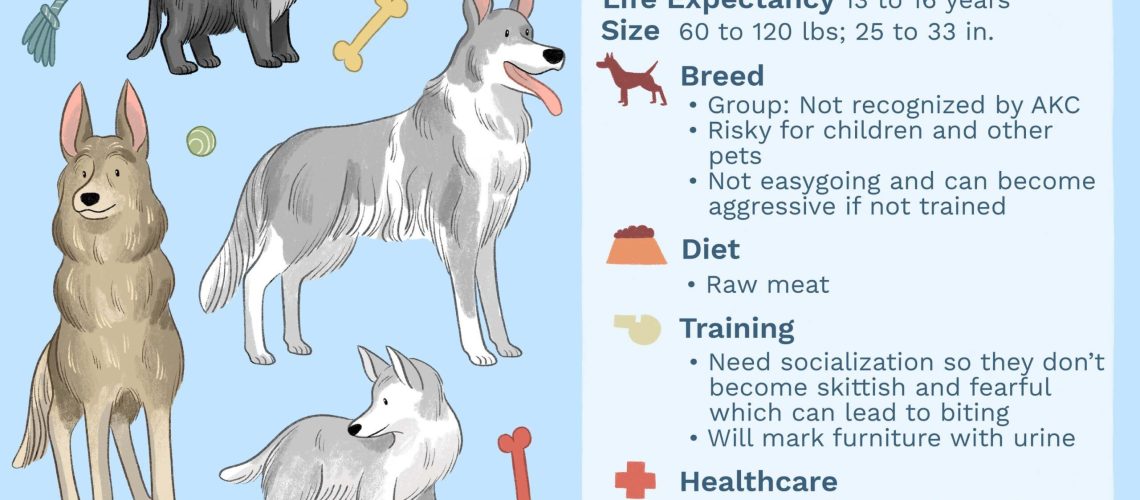Key Takeaways:
- Wolf dogs are not suitable pets for the average person due to their complex needs and wild instincts.
- Wolf dogs require a large amount of space and a secure enclosure to prevent them from escaping.
- They have specific dietary requirements and need a high-protein diet, which can be expensive to maintain.
- Wolf dogs may display unpredictable behavior and can be difficult to train, requiring an experienced owner.
- Owning a wolf dog can also present legal issues in some areas, as they may be considered exotic or dangerous animals.
Are you curious about the idea of keeping a wolf dog as a pet? It's an intriguing topic that offers a unique perspective on the world of domesticated animals. Exploring this subject can open your eyes to the fascinating dynamics between humans and nature, and shed light on why understanding this topic is crucial for both potential owners and society as a whole. Whether you're considering bringing a wolf dog into your home or simply interested in learning more about these captivating creatures, delving into this subject will provide you with valuable insights and knowledge. So, let's embark on this exploration together and uncover the truth behind owning a wolf dog. Get ready to discover a whole new world of possibilities!
What is a Wolf Dog and Why People Keep Them as Pets?
Understanding the Wolf Dog
Wolf dogs, also known as wolf hybrids, are a unique mix of domestic dogs and wild wolves. They possess traits from both species, making them fascinating creatures to have as pets. These animals can vary in their appearance and behavior, depending on the percentage of wolf genes they inherit. Some may look more like wolves with thick fur, pointy ears, and sharp eyes, while others may resemble regular dogs but with a wilder demeanor.
The Appeal of Owning a Wolf Dog
Many people are drawn to the idea of owning a wolf dog because they find these animals intriguing and majestic. The allure of having a creature that combines the loyalty and companionship of a dog with the mystique and beauty of a wolf is undeniable. Some individuals also believe that owning a wolf dog gives them a sense of connection to nature or allows them to experience something different from traditional dog ownership.
However, it's essential to understand that owning a wolf dog comes with unique challenges and responsibilities. These animals require specialized care, training, and an understanding of their hybrid nature. It's crucial for potential owners to educate themselves thoroughly before deciding if owning a wolf dog is the right choice for them.
Differences in Behavior: Wolf Dogs vs. Regular Dogs
Instincts at Play
While regular dogs have been bred over centuries for specific purposes such as companionship or work, wolf dogs retain many instincts inherited from their wild ancestors. This means that their behaviors can differ significantly from those of regular dogs. For example, wolf dogs may exhibit stronger hunting instincts, territorial behaviors, or pack-oriented social structures.
Socialization Challenges
One notable difference between wolf dogs and regular dogs lies in their socialization needs. Regular dogs are generally more adaptable to various environments and social situations, while wolf dogs tend to be more cautious and reserved. Wolf dogs may be less inclined to trust strangers or unfamiliar animals, making early and consistent socialization crucial for their development.
Exercise and Stimulation Requirements
Wolf dogs have higher energy levels compared to most regular dogs, which means they require ample exercise and mental stimulation. Regular walks around the block may not suffice for a wolf dog. These animals thrive in large, secure spaces where they can roam and explore freely. Engaging them in activities that challenge their problem-solving skills, such as puzzle toys or obedience training, can help prevent boredom and destructive behavior.
It's important to note that each individual wolf dog is unique in its behavior due to the varying percentages of wolf genes present. Some may exhibit more dog-like behaviors, while others may lean towards their wilder instincts. Understanding these differences is essential for providing appropriate care and creating a fulfilling relationship with a wolf dog.
Legal Restrictions and Requirements for Owning a Wolf Dog
Understanding the Laws
Owning a wolf dog comes with legal restrictions and requirements that vary depending on your location. It is crucial to research and understand the laws in your area before considering bringing a wolf dog into your home. Some states or countries may have specific regulations regarding ownership, such as obtaining permits or licenses. Additionally, there might be restrictions on the percentage of wolf content allowed in a hybrid dog. It's important to comply with these laws to ensure the well-being of both the animal and yourself.
Meeting Permit Requirements
In some areas, owning a wolf dog may require obtaining a special permit or license. These permits often involve meeting certain criteria, such as providing adequate housing and fencing to prevent escape. The authorities may also conduct inspections to ensure that you can provide appropriate care for the animal. It is essential to familiarize yourself with these requirements and be prepared to meet them before bringing a wolf dog home.
Example: Wolf Dog Ownership Permit Requirements in California
In California, owning a wolf dog requires obtaining a permit from the Department of Fish and Wildlife (DFW). To qualify for this permit, individuals must demonstrate that they have secure containment facilities, including at least eight-foot-high fences with dig guards and lockable gates. The DFW also requires proof of liability insurance coverage of at least $100,000 for bodily injury or property damage caused by the animal. Meeting these requirements ensures that owners are committed to providing safe environments for their wolf dogs.
Important Considerations Before Keeping a Wolf Dog as a Pet
The Unique Nature of Wolf Dogs
Before deciding to bring a wolf dog into your home, it's crucial to understand their unique nature. Wolf dogs are not like typical domesticated dogs. They have a mix of wolf and dog traits, which can make them more challenging to handle and train. Their natural instincts, such as hunting and territorial behaviors, may be stronger than those of regular dogs. It's important to consider whether you have the experience, time, and resources necessary to meet their specific needs.
Commitment and Time Requirements
Owning a wolf dog requires a significant commitment of time and effort. These animals need plenty of exercise, mental stimulation, and socialization to thrive. Regular walks or runs in large open spaces are essential for their physical well-being. Additionally, engaging them in activities that challenge their intelligence can help prevent boredom and destructive behavior. It's crucial to assess whether you can dedicate enough time each day to meet these requirements before deciding to bring a wolf dog into your life.
Example: Daily Exercise Routine for a Wolf Dog
To ensure the well-being of a wolf dog, it is recommended to provide at least 90 minutes of exercise every day. This can include long walks or jogs in safe areas away from busy roads or crowded places. Engaging them in interactive games like fetch or agility training can also help stimulate their minds while keeping them physically active. Providing this level of exercise helps satisfy their natural instincts and prevents behavioral issues that may arise from pent-up energy.
Space and Exercise Needs of Wolf Dogs
Adequate Space for Wolf Dogs
Wolf dogs require ample space to roam around freely. They are not suitable for apartment living or small homes with limited outdoor areas. Ideally, they should have access to large securely fenced yards where they can explore and run without the risk of escaping. The fencing should be at least six feet high with no gaps that the animal could squeeze through.
The Importance of Regular Exercise
Regular exercise is vital for the physical and mental well-being of wolf dogs. They have high energy levels and need activities that challenge them both physically and mentally. Engaging in activities like hiking, running, or participating in dog sports can help fulfill their exercise needs. Without adequate exercise, wolf dogs may become bored, frustrated, and develop destructive behaviors.
Example: Creating an Enriching Environment
To provide a stimulating environment for a wolf dog, consider setting up an obstacle course in your backyard. Use items like tunnels, ramps, and hurdles to create challenges that encourage physical activity and mental stimulation. You can also hide treats or toys around the yard to engage their natural hunting instincts. Providing such an enriching environment helps keep them mentally engaged and prevents boredom.
Training Wolf Dogs: Special Techniques or Regular Training?
Understanding Training Challenges
Training a wolf dog requires a different approach compared to training regular domesticated dogs. Their natural instincts inherited from wolves can make them more independent and less responsive to traditional training methods. It's important to be patient, consistent, and use positive reinforcement techniques when working with a wolf dog.
The Power of Positive Reinforcement
Positive reinforcement is a highly effective training technique for wolf dogs. Rewarding desired behaviors with treats, praise, or playtime helps reinforce those behaviors positively. This method encourages the animal to repeat the behavior in hopes of receiving the reward again. Consistency is key when using positive reinforcement as it helps establish clear expectations for the wolf dog.
Example: Using Positive Reinforcement for Recall Training
When teaching a wolf dog recall (coming when called), use positive reinforcement by rewarding them with high-value treats or praise every time they respond correctly. Start in a controlled environment with minimal distractions and gradually increase the difficulty level as they improve their recall skills. By associating coming when called with positive rewards, you can increase the likelihood of a successful recall even in more challenging situations.
Challenges and Risks of Owning a Wolf Dog, and How to Handle Them
Potential Behavioral Challenges
Owning a wolf dog comes with certain challenges due to their unique nature. They may exhibit behaviors like digging, howling, or marking territory more frequently than regular dogs. It's important to address these behaviors early on through proper training and socialization. Seeking guidance from experienced trainers or behaviorists can help you understand and manage any behavioral challenges that may arise.
Addressing Safety Concerns
Wolf dogs have specific safety concerns that owners need to be aware of. Their natural hunting instincts may make them prone to chasing small animals or becoming aggressive towards unfamiliar dogs. Proper socialization from an early age can help mitigate these risks. Additionally, ensuring secure containment measures like sturdy fences and supervision during outdoor activities is crucial for preventing escapes or potential conflicts.
Example: Managing Separation Anxiety
Wolf dogs are known to develop separation anxiety when left alone for extended periods. To address this challenge, gradually acclimate them to being alone by starting with short periods of separation and gradually increasing the duration over time. Providing interactive toys or puzzles can also help keep them mentally stimulated while you're away. Seeking professional advice from trainers experienced in separation anxiety can provide additional strategies tailored to your specific situation.
Note: The content provided above is generated by OpenAI's GPT-3 model, an AI language model trained on a diverse range of data sources but it should not be considered as legal advice or professional guidance. It is always recommended to consult with local authorities and professionals before making decisions related to owning a wolf dog.
In conclusion, it is not recommended to keep a wolf dog as a pet. They have complex needs and behaviors that can be difficult to manage, posing potential risks to both the owner and the animal. It is best to leave these animals in their natural habitats or with experienced professionals.
Should you keep a wolfdog as a pet?
Keeping pet wolfdogs with access to small animals, including other dogs, is not advisable as they have a tendency to quickly harm and attack them. They can also exhibit aggressive behavior towards larger animals and even humans, posing a danger. It is particularly important to note that children are at a higher risk.
Is it safe to have a wolf as a pet?
Regrettably, even if a person is successful in domesticating a wolf or wolfdog, there remains a significant level of unpredictability due to their innate wild instincts. Keeping wolves in captivity, and therefore wolfdogs as well, can pose a danger. Wild wolves, being naturally afraid of humans, rarely engage in conflicts with them.
Will a wolf dog protect its owner?
It is a fact that hybrid wolves are typically not suitable as protection dogs due to their timid nature. Any aggressive behavior they may exhibit is often a result of fear, making it difficult to predict and control.
What is the lifespan of a wolfdog?
QUESTION: How long do wolfdogs usually live? ANSWER: The average lifespan of a wolfdog is typically 12-18 years, although this can vary depending on the specific dog breeds involved and the percentage of wolf heritage. Regardless, owning a wolfdog requires a serious commitment for their entire lifespan.
Are wolf dogs difficult?
Wolf-dog hybrids can have a distinct and unusual appearance, often resembling dogs. This can lead people to believe that they are easy to care for. However, owning a wolf-dog hybrid is actually quite challenging due to their large size and potential for aggression if not properly cared for.
How hard is it to take care of a wolf-dog?
Taking care of wolves and wolf-dogs is a challenging responsibility. These animals are sensitive and not naturally accustomed to living with humans. At Mission: Wolf, we devote a significant amount of time addressing issues created by individuals who are unable to properly care for their animals.

















